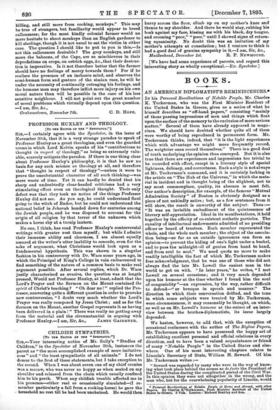PROFESSOR HUXLEY AND THEOLOGY.
[To TEX EDITOR OP TRH "SPECTATOR."] SIR,—I certainly agree with the Spectator, in the issue of November 30th, that it is a very strange paradox to speak of Professor Huxley as a great theologian, and even the guarded terms in which Lord Kelvin speaks of his "contributions to thought in respect of theology," as being so extremely valu- able, scarcely mitigate the paradox. H there is one thing clear about Professor Huxley's philosophy, it is that he saw no basis for any such science as theology at all, and therefore that "thought in respect of theology "—unless it were to prove the unsubstantial character of all such thinking—was mere waste of time. Yet it can hardly be denied that his sharp and undoubtedly clear-headed criticisms had a very stimulating effect even on theological thought. Their only defect was that they took no notice of the things Professor Huxley did not see. As you say, he could understand Saul going to the witch of Endor, but he could not understand the national belief in Jehovah handed down for centuries among the Jewish people, and he was disposed to account for the origin of all religion by that terror of the unknown which makes a horse shy at a turnip lantern.
No one, I think, has read Professor Huxley's controversial writings with greater zest than myself ; but while I admire their immense ability and clearness, I am almost equally amazed at the writer's utter inability to concede, even for the sake of argument, what Christiana would look upon as a fundamental hypothesis. This was shown in a singular fashion in his controversy with Dr. Wace some years ago, in which the Principal of King's College in vain endeavoured to find something of the nature of a common basis to make real argument possible. After several replies, which Dr. Wace justly characterised as evasive, the question was at length pressed, Would not Professor Huxley, at least, admit that the Lord's Prayer and the Sermon on the Mount contained the spirit of Christ's teaching ? "Oh dear no ! " replied the Pro- fessor, answering quite a different question in order to provoke new controversies, "I doubt very much whether the Lord's Prayer was really composed by Jesus Christ ; and as for the Sermon on the Mount, another Gospel represents it as having been delivered in a plain ! " There was really no getting away from the material and the circumstantial in arguing with
Professor Huxley.—I am, Sir, &c., JAMES GAIRDNER.






















































 Previous page
Previous page